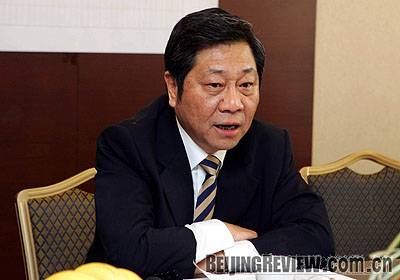|

DEATH SENTENCE: Former Beijing Vice Mayor Liu Zhihua, who was convicted of taking bribes worthy of about 7 million yuan ($1.02 million), received a death sentence in October 2008. This picture was taken when Liu was still in office
On the 10th anniversary of China's anti-corruption drive, President Hu Jintao called for greater efforts to carry it out.
Speaking at the Party School of the Central Committee of the Communist Party of China (CPC) on June 25, he said the country had taken great strides forward in dealing with corruption in the past decade but should not rest in fighting it.
After the President's announcement, the CPC's Central Commission for Discipline Inspection (CCDI), the party's highest anti-corruption organ, held a national teleconference to convey Hu's instructions, sum up experiences in building a clean government and make plans for the future.
At the same time, in order to further implement the establishment of a clean government and curb unhealthy trends in selecting and appointing cadres, the CCDI and the Organization Department of the CPC Central Committee (the Party's highest body for inspection, training and selecting cadres) jointly issued a document on further improving fairness and clarity in selecting and appointing cadres.
Li Yuanchao, Minister of the Organization Department of the CPC Central Committee, said that curbing unhealthy trends in selecting and appointing cadres is a crucial measure to improve the credibility of officials. In recent years, the Chinese Government has achieved marked success in this regard, and the general condition of cadre selection and appointment is good. But, at the same time, this is still a very prominent issue that arouses the concern of common people.
With increasing anti-corruption efforts, many illegal activities have been brought light.
At a conference in August 2008, Li Yuanchao pointed out that the government would take three to five years to improve the selection and appointment process for cadres to a level that is satisfactory to the general public. In this regard, he put forward four specific measures, one of which was tackling unhealthy practices in selecting cadres.
He suggested strengthening the supervision of the appointment system. Local party standing committees should carry out appraisals of the system in order to improve it, he said.
| 